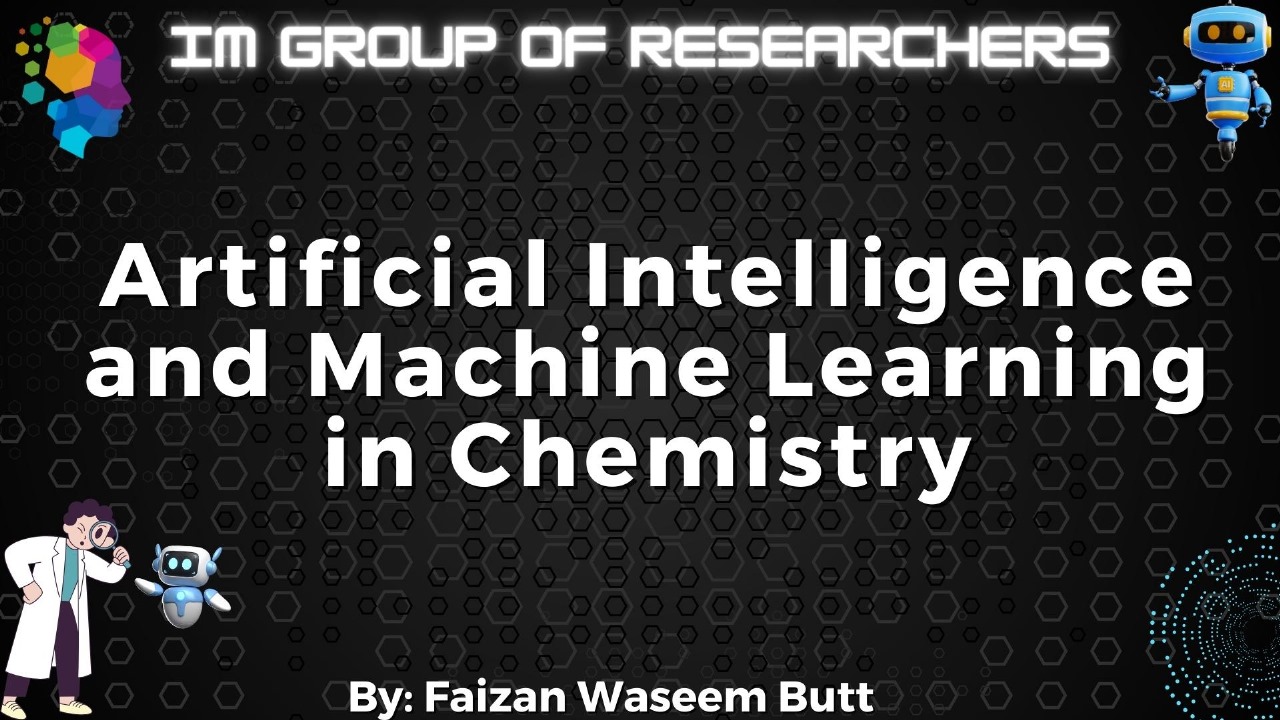Artificial Intelligence and Machine Learning in Chemistry: Transforming the Alchemy of Discovery
In the annals of human history, the word “alchemy” once evoked images of secretive laboratories, mysterious elixirs, and the relentless pursuit of turning base metals into gold. Today, while we no longer chase the mythical Philosopher’s Stone, a new form of alchemy is taking place in the world of science and technology, where researchers are leveraging Artificial Intelligence (AI) and Machine Learning (ML) to transmute data into invaluable insights in the realm of chemistry. This dynamic duo is reshaping the way we explore the molecular world, enabling us to discover new compounds, optimize chemical processes, and propel us into a future where drug discovery, materials science, and environmental sustainability are transformed beyond our wildest dreams. Read our short review article on “Artificial Intelligence and Machine Learning in Chemistry: Transforming the Alchemy of Discovery”.
Author:
Faizan Waseem Butt

The Marriage of Chemistry and AI
At its core, chemistry is the art of understanding and manipulating matter at the molecular level. Traditionally, this has been a labor-intensive endeavor, with chemists spending hours at the bench meticulously crafting compounds and performing experiments. Enter AI and ML, the game-changers. These technologies bring computational horsepower and pattern recognition capabilities to the forefront, allowing chemists to harness the power of data like never before.
The Elemental Foundations of AI
Imagine AI as the guiding spirit in our modern-day laboratory. AI, in this context, is akin to the lab assistant who never tires, never errs, and never forgets. It’s the master of pattern recognition, learning from vast datasets to predict outcomes, make recommendations, and discover hidden relationships within chemical data.
AI is the digital alchemist, the Merlin of our data-driven Camelot. Its abilities lie in the manipulation of data to uncover hidden treasures. Here are some of the ways AI is making chemistry its kingdom:
Predictive Modeling
In predictive modeling, AI can forecast the properties of new chemical compounds. This is a leap forward in drug discovery, as it allows chemists to predict how potential drugs will behave, saving time and resources in the search for new treatments.
Autonomous Laboratories
In autonomous laboratories, AI-driven robots carry out experiments and analyses with precision and consistency. This means round-the-clock experimentation, cutting down timeframes and human errors.
Quantum Chemistry
Quantum chemistry, an AI specialty, models the quantum behavior of atoms and molecules, providing a deeper understanding of molecular interactions. This knowledge is crucial in designing new materials with unique properties.
Drug Discovery
AI expedites drug discovery by sifting through vast databases of chemical compounds to identify potential candidates for specific diseases. This virtual screening saves years of trial and error.
Machine Learning: The Art of Adaptation
Machine Learning, on the other hand, is the alchemical scholar, constantly learning and evolving. It’s the philosopher’s stone of chemistry, capable of turning data into actionable insights. ML algorithms can adapt, improve, and refine their predictions as they consume more data, making them invaluable in various chemical endeavors:
Structure-Activity Relationship (SAR) Prediction
ML models excel at predicting the relationship between the chemical structure of a compound and its biological activity. This insight is essential in drug discovery, as it helps identify promising drug candidates.
Materials Discovery
ML accelerates the discovery of novel materials by analyzing and predicting their properties. This has applications in electronics, energy storage, and materials science.
Spectroscopy Analysis
ML algorithms are proficient at interpreting complex spectroscopic data, such as nuclear magnetic resonance (NMR) or mass spectrometry. This capability aids in identifying and characterizing chemical compounds.
Reaction Optimization
In chemical synthesis, ML can optimize reaction conditions and suggest modifications to improve yields and reduce waste, contributing to greener chemistry practices.
AI and ML in Unison: The Elixir of Knowledge
When AI and ML combine forces, they produce a potent elixir. They become the modern-day alchemists, capable of transmuting raw data into the gold of knowledge. Their synergy extends to various aspects of chemistry, revolutionizing how we explore the molecular world:
Chemoinformatics
In chemoinformatics, the combined power of AI and ML aids in the organization, retrieval, and analysis of chemical information. This is particularly useful in managing large chemical databases.
High-Throughput Screening
In drug discovery, high-throughput screening combines automation and AI-driven analysis to test thousands of compounds quickly, accelerating the identification of potential drug candidates.
Biomolecular Simulation
AI and ML can simulate the behavior of biomolecules, providing insights into protein folding, molecular interactions, and drug binding, crucial in understanding diseases and drug design.
Green Chemistry
AI and ML contribute to greener chemistry practices by optimizing reaction conditions, reducing waste, and suggesting eco-friendly alternatives, aligning with the principles of sustainable chemistry.
Challenges and Ethical Considerations
While the prospects of AI and ML in chemistry are breathtaking, they come with their own set of challenges. Privacy concerns, data biases, and ethical questions surround the use of these technologies. Researchers must be vigilant, ensuring that the AI and ML alchemy benefits humanity without unintended consequences.
Data Bias and Fairness
AI and ML models can inherit biases present in training data, leading to unfair outcomes. In chemistry, this could have serious implications in areas like drug discovery if certain patient populations are underrepresented in training data.
Ethical AI in Drug Discovery
The use of AI in drug discovery poses ethical questions regarding transparency, accountability, and the responsible use of AI to develop life-saving treatments.
Intellectual Property
Who owns the discoveries made by AI and ML algorithms? The question of intellectual property rights is a complex one, especially when algorithms contribute significantly to research.
Safety and Security
With the increasing use of autonomous laboratories driven by AI, there are concerns about safety protocols and cybersecurity measures to protect against unauthorized access or malicious use.
Conclusion: The Dawn of a New Alchemy
In the enchanting world of chemistry, where the pursuit of knowledge meets the boundless realms of possibility, we find ourselves at the dawn of a new alchemy. Artificial Intelligence and Machine Learning have cast a spell, not to turn lead into gold, but to transmute data into insights that hold the promise of a brighter, healthier, and more sustainable future.
The union of AI’s computational prowess and ML’s adaptive intelligence has ushered in a golden age of discovery. We are on the cusp of unraveling the molecular secrets that have eluded us for centuries, from designing life-saving drugs with pinpoint precision to crafting materials that defy convention.
However, in this grand pursuit, we must tread with caution. Ethical dilemmas, data biases, and questions of ownership loom like shadows in our path. But just as the alchemists of old persevered in their quest for knowledge, we too must continue to explore the frontiers of AI and ML in chemistry with wisdom and responsibility.
As we forge ahead into this brave new world, let us remember that, much like the alchemists of old, we are bound by the unyielding pursuit of understanding and progress. With the elixir of AI and ML in our hands, we hold the keys to unlock the secrets of the molecular universe, crafting a future that once seemed purely the stuff of dreams.
Also read: Exploring the Complex World of Flavor Chemistry
Follow Us on

